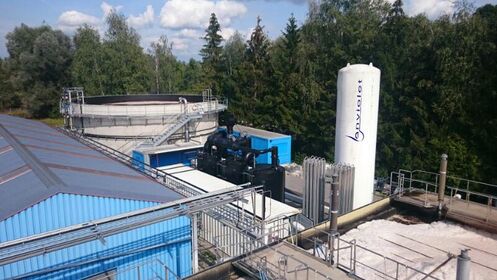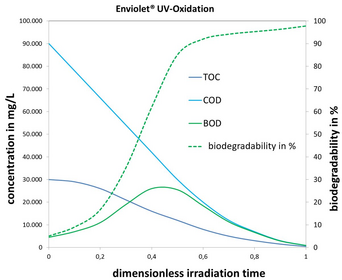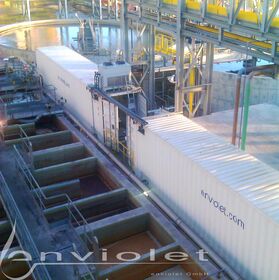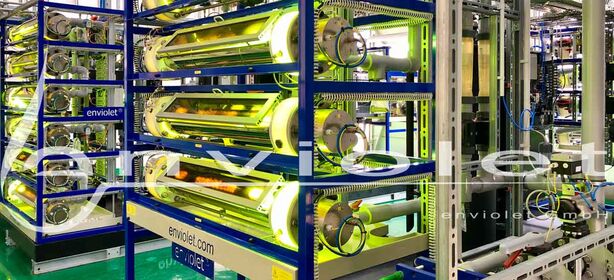uv reactors, photo-oxidation, advanced oxidation (aop), recycling & engineering
for industrial use
UV-applications
Advanced Oxidation Processes (AOP)
Increase of Bio-Degradability
UV-oxidation increases the bio-degradability of persistant organics and eliminates bio-toxic substances directly - the perfect pre treatment of wastewater passing into biological treatment plants.
Photo-Oxidation is perfect for pretreatment of toxic and/or persistent waste waters. UV-Oxidation of toxic and persistent compounds leads usually to a waste water with good bio-degradability by microorganisms. This offers the possibility to process the wastewater in the own company biology and avoids the high costs for external collection and processing. The best advantage is to combine Enviolet's AOP with the own already existing biological treatment plant, or sending it to the municipal biological wastewater treatment plant.
Most of these installations we have reliazed for chemical and pharaceutical industry.
Socalled strong wastewaters can be pre-treated in our photo-oxidation-plants, without increasing salt load, and pumped into the biological wastewater treatment plant.
Well known references are BASF (several units for pre-treatment), GSK (detoxification of e.g. Antibiotics), DOW (various AOP-plants for very different duties of advanced ocidation), Merck ( typically AOP for pretreatment of concentrates from chemical synthesis) and Atotech (advanced oxidation for elimination of chelates and recalcitrant organic amines).
In case of interest on our applications for advanced oxidation, please contact us: ms(at)enviolet.com


Combination of UV-oxidation and biological wastewater
Combining UV-oxidation and biological wastewater for treatment of persistent and toxic organic matter is state of the art!




Degradation of toxic compounds and establishment of biological treatability of industrial wastewater
Improve the biodegradability of industrial wastewater
The two figures show a plant where up to 360 m³/day of industrial wastewater with a COD of up to 45 g/L is pre-treated to the point where it can be discharged into the site's biological treatment plant. Before enviolet's AOP plant was in operation, the wastewater had to be disposed of separately, as the performance of the existing biology came to a complete standstill within a few days. The special feature of enviolet's operating-cost-optimised solution is that constant operation of the biological wastewater treatment plant is now possible: through electronic communication between biology and production with the enviolet plant, the latter's performance is driven in such a way that stable operating conditions prevail with minimal operating costs.







